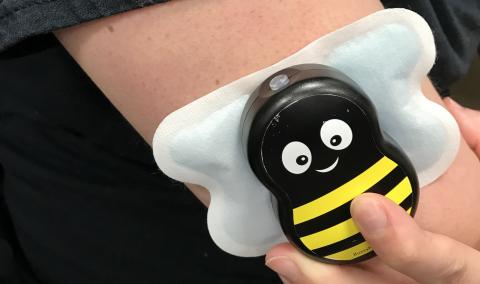MU Health Care offers the region’s most comprehensive sickle cell disease program for adults over age 18. We use the latest therapies and expertise in complications such as anemia and pain crisis to help you stay healthy and pain-free.
Our team creates a customized care plan and coordinates all the services you need.
Sickle cell diseases include a spectrum of conditions that include:
- Sickle cell anemia
- Hemoglobin SC disease
- Sickle cell traits
- Thalassemia syndromes
Even the common sickle cell anemia is different for each person. At MU Health Care, we create personalized care plans tailored to the type of sickle cell disease and your overall needs.
Treatment options for sickle cell disease are expanding and changing.
Your care team at MU Health Care will be led by an experienced hematologist — a doctor who specializes in diseases of the blood — who can quickly identify problems and address them as soon as possible so you can live your fullest, most active life.
Sickle cell pain crisis and other health complications
Sickle cell disease is a life-changing inherited blood disorder. Adults with sickle cell have lived with pain crisis since childhood. In addition to pain, sickle cell disease can lead to complications such as sickle cell anemia and bone necrosis.
Your care team will include specialists as needed to help prevent and treat conditions such as:
- Acute chest syndrome
- Anemia
- Bone and joint pain
- Infections
- Leg ulcers
- Organ failure
- Priapism
- Pulmonary hypertension
- Splenic sequestration
- Stroke
- Vision loss
Treating sickle cell disease at MU Health Care
On your first visit, we’ll assess your medical status and history. You’ll receive a care plan that may include a range of tests and treatments. To make it easy, we’ll arrange everything for you.
Our priority is to manage your condition — not just your symptoms —for the long-term so you can be your healthiest self. We may use:
Pain Management
Effectively managing sickle cell pain crisis is important for your physical and mental health. These pain control strategies include:
- Pain medications
- Intravenous (IV) fluids
- Blood transfusions
- Counseling
Rather than just masking your pain, we work to find the cause so you can get relief.
By anticipating and correcting conditions that can lead to pain, your risk of needing addictive medications is lowered.
Blood Transfusion Therapy
Most adults with sickle cell disease will have had blood transfusions in childhood.
You may receive simple blood transfusions that add new blood cells without removing old ones. You also may receive exchange transfusions, which remove blood cells and exchange them for healthy donor cells.
Your team understands the risks involved in blood transfusion therapy, safely balancing the health risks with the benefits.
Emerging Treatments
Stem cell transplants and gene therapy are quickly evolving into effective options to treat and potentially cure sickle cell disease.
Stem cell transplants replace stem cells in the bone marrow with healthy donor cells. The new cells make normal, round red blood cells instead of the sickle-shaped ones.
Gene therapy involves adding or replacing a normal copy of the gene that causes sickle cell disease. This can help the body produce normal red blood cells.
We’ll help you understand your options and can refer you to a collaborating provider for these treatments. Our team coordinates everything, making the process as seamless and convenient as possible.
Medications
As an academic health system, MU Health Care’s doctors follow the latest research and offer new medications once they’re proven to be safe and effective. These medications can help control pain, reduce the risk for organ failure and improve your quality of life.
Voxelotor, L-Glutamine and Crizanlizumab are some of the new medications that not only improve blood levels, but lessen pain crisis episodes as well.
Infusion center offers better outcomes and convenience
MU Health Care provides the area’s only sickle cell day stay hospital infusion program. You come to the hospital just for the day with no overnight stay.
If you have pain that’s difficult to control, you can receive twice-weekly day stay visits for regular IV fluids and pain medications in our comfortable infusion center. This can mean fewer emergency visits and less time spent in the hospital for pain crisis.
For your convenience, we also offer exchange transfusions in our day stay hospital infusion center.
Your lifelong partner in care
Adults with sickle cell disease do better with a team that’s here as you age out of pediatric health care. Our team includes a hematologist, a nurse navigator and nurse practitioners who are with you for the long-term.
As an academic health system, MU Health Care has many highly skilled specialists who understand sickle cell disease and related conditions. We partner with cardiologists, ophthalmologists, orthopedists, nephrologists and more. You can get all this care in one place.
Sickle cell traits and planning your family
Because sickle cell disease is an inherited condition, you may have questions about family planning. We’ll help you understand what it means to be a carrier of a sickle cell trait and the risks of passing it to your children.
Related Conditions & Treatments
- Adolescent Medicine
- Chest Wall Deformities
- Down Syndrome
- Emergency Care for Kids
- Gastrostomy and Feeding Access Program
- Hyperbaric Oxygen Therapy
- Juvenile Diabetes
- Neonatology
- Pediatric Anesthesiology
- Pediatric Cancer
- Pectus Carinatum
- Pectus Excavatum
- Pediatric Cardiology
- Pediatric Dermatology
- Pediatric Development and Behavior
- Pediatric ENT (Ear, Nose and Throat)
- Pediatric Epilepsy
- Pediatric Eye Care
- Pediatric Gastroenterology
- Pediatric Infectious Diseases
- Pediatric Inpatient Rehabilitation
- Pediatric Nephrology
- Pediatric Neurology
- Pediatric Neurosurgery
- Pediatric Orthopaedics
- Pediatric Plastic Surgery
- Pediatric Primary Care
- Pediatric Psychiatry
- Pediatric Pulmonary Medicine
- Pediatric Sleep Medicine
- Pediatric Surgery
- Pediatric Surgical Services
- Pediatric Urology
- Pediatric Vascular Anomalies
- Pediatric Weight Management
- Sickle Cell Disease
- Aerodigestive Program



























